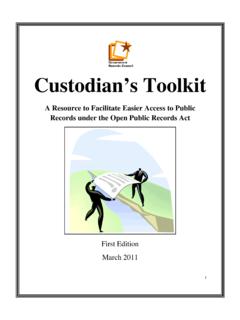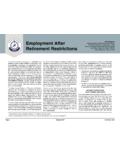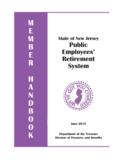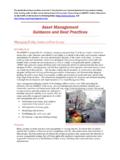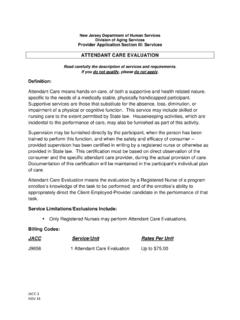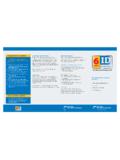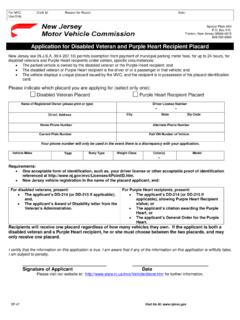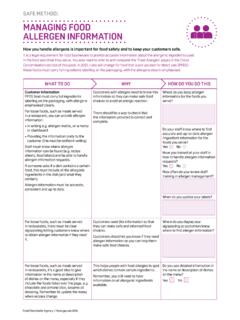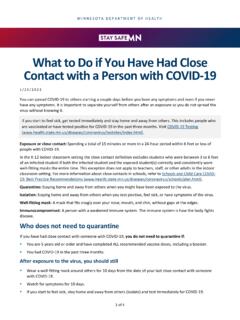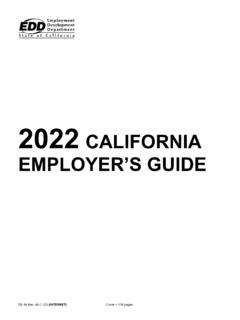Transcription of Who Must File You must file a New Jersey income tax return if–
1 FILING INFORMATION Your filing status and gross income determine whether you have to file a tax return . Age is not a factor in determining whether a person must file. Even minors (including students)and senior citizens must file if they meet the income filing requirements. Gross income means reportable income after exclusions but before personal exemptions aresubtracted. It does not include nonreportable (exempt) benefits. See page 13 to find out whichtypes of income are not reportable. Members of the Armed Forces see page 3 for additional the following chart to determine whether you must file a tax return . This chart is a guide onlyand may not cover every situation. If you need assistance, call the New Jersey Tax Hotline (609-588-2200).Who must FileYou must file a New Jersey income tax return if Your filing status is:and your gross incomewas more than:Use Form:NonresidentYou were a New Jersey nonresident if you met all three of thefollowing conditions for the entire year, and you weredomiciled here: You did not maintain a permanent* home inNew Jersey ; and You did maintain a permanent home outside ofNew Jersey ; andSingleMarried, filing joint returnHead of HouseholdQualifying Widow(er)$7,500(from all sources)NJ-1040NR You did not spend more than 30 days in New Jersey ;orNew Jersey was not your domicile, and you spent less than183 days here.
2 OrNew Jersey was not your domicile, you spent more than 183 dayshere, but you did not maintain a permanent home , filing separate return $3,750(from all sources)(Nonresident return )Part-year residentYou were a part-year New Jersey resident if you met thedefinition of resident or nonresident for only part of the , filing joint returnHead of HouseholdQualifying Widow(er)$7,500 from all sources(for the entire year)NJ-1040**Married, filing separate return $3,750 from all sources(for the entire year)(Resident return )Full year residentYou were a full year New Jersey resident if: New Jersey was your domicile (permanent legal residence) forthe entire year (whether or not you were a member of theArmed Forces);SingleMarried, filing joint returnHead of HouseholdQualifying Widow(er)$7,500NJ-1040or New Jersey was not your domicile, but you maintained apermanent* home in New Jersey for the entire year and youspent more than 183 days in New Jersey . (If you are amember of the Armed Forces stationed here and New Jerseyis not your domicile, you are not a resident under thisdefinition.)
3 Married, filing separate return $3,750(Resident return )*A home (whether inside or outside of New Jersey ) is not permanent if it is maintained only during a temporary or limited period for the accomplishment of a particularpurpose. Likewise, a home used only for vacations is not a permanent home.**Both resident and nonresident returns may have to be filed when a part-year resident receives income from New Jersey sources during the period of Pennsylvania Residents:As a result of the Reciprocal Personal income Tax Agreement between the Commonwealth of Pennsylvania andthe State of New Jersey , compensation paid to Pennsylvania residents employed in New Jersey is not subject toNew Jersey income tax. For more information, see page 2 NJ-1040-NROther Filing InformationMarried Persons and Filing Status. If both you and your spouse werenonresidents of New Jersey during the entire taxable year, and only one ofyou earned, received or acquired income from New Jersey sources, thespouse who had income from New Jersey sources may file a separate NewJersey return even though you filed a joint Federal return .
4 The spouse withincome from New Jersey sources computes income and exemptions as if aFederal married filing separate return had been filed. You have the optionof filing a joint return , but remember, joint income would be reported inColumn A of Form one spouse was a nonresident and the other a resident of New Jerseyduring the entire taxable year and both had income from New Jerseysources, separate New Jersey returns may be filed (the nonresident files anonresident return and the resident files a resident return ). Each spousecomputes income and exemptions as if Federal married filing separatereturns had been filed. You have the option of filing a jointAVOIDING COMMON MISTAKESC heck the following items to avoid delays in processing returns andrefunds. Name, Address and Social Security Number should bechecked for accuracy whether you use the peel-off label or writethe information on the form. Be sure your social security numberappears on all documents submitted with your return .
5 Alsoindicate your state of residency in the space provided. Use the Correct Form for your tax situation. See the WhoMust File chart on page 1. Read Instructions carefully before completing your return . Use the State Wages figure(s) from your W-2(s), not the Federal Wages amount. Complete both Column A and Column B, Lines 33-45. Attach all necessary forms, schedules and other documents toyour return . See page 11. Check Arithmetic. Sign and date your return . Both spouses must sign a joint return . Pay any balance due with your return . Write your socialsecurity number on your check. Keep a copy of your return for your records. Mail your return to the appropriate address. Check theaddress to which you are sending your return . Don t mail yourNew Jersey income tax return to the Internal Revenue Service. Changes or mistakes to your original return may be corrected byfiling an amended return . See page 6. Look for this symbol throughout these instructions for new orimportant return , but remember, joint income would be taxed as if bothspouses were A domicile is any place you regard as your permanent home theplace to which you intend to return after a period of absence (as on vacationabroad, business assignment, educational leave, etc.)
6 A person has only onedomicile, although he or she may have more than one place to live. Onceestablished, your domicile continues until you move to a new location withthe intent to establish your permanent home there and to abandon your NewJersey domicile. Moving to a new location, even for a long time, does notchange your domicile if you intend to return to New place of abode, whether inside or outside of New Jersey is not permanentif it is maintained only during a temporary stay for the accomplishment of aparticular purpose ( , temporary job assignment). If New Jersey is yourdomicile, you will be considered a resident for New Jersey tax purposesunless you meet all three conditions for nonresident status (see Who MustFile on page 1). Likewise, if New Jersey is not your domicile, you willonly be considered a New Jersey resident if you maintain a permanent homeand spend more than 183 days ResidentsIncome from New Jersey . As a result of the Reciprocal Personal IncomeTax Agreement between the Commonwealth of Pennsylvania and the Stateof New Jersey , compensation paid to Pennsylvania residents employed inNew Jersey is not subject to the New Jersey income tax.
7 Compensationmeans salaries, wages, tips, fees, commissions, bonuses and otherremuneration received for services rendered as an BILL OF RIGHTSThe New Jersey Taxpayers Bill of Rights simplifies tax admini-stration and ensures that all taxpayers individuals and businessesalike are better informed and receive fair and equitable treatmentduring the tax collection process. Highlights of the Taxpayers Bill ofRights include:Service Division must respond to taxpayers questions within a reasonabletime period. Notices of taxes and penalties due must clearly identify the purposeof the notice and must contain information about appeal Time to appeal to the Tax Court is generally 90 on Refunds Interest is paid at the prime rate on refunds for all taxes when theDivision takes more than six months to send you a refund. You may request that your overpayment of this year s tax becredited towards next year s tax liability, however, interest will notbe paid on overpayments that are credited more information on the rights and obligations of both tax-payersand the Division of Taxation under the Taxpayers Bill of Rights, callthe Division s automated information and assistance service.
8 (See backcover.) 1996 Form NJ-1040NR 3 Pennsylvania Residents - continuedIf New Jersey income tax was withheld from your wages, you must filea New Jersey nonresident return to obtain a refund. To stop the with-holding of New Jersey income tax, complete a New Jersey Certificateof Nonresidence (Form NJ-165) and give it to your employer. You mayobtain Form NJ-165 by calling our Tax Reciprocal Agreement covers compensation only. If you are self-employed or receive other income (for example, gain from sale of prop-erty) which is taxable in both states, you must file a New Jersey non-resident return and report the income A. Complete Column A, Lines 33 through 45, showingincome from B. When Pennsylvania residents complete Column B, em-ployee compensation from New Jersey sources should not be includedon Line 33. For Pennsylvania residents Line 33, Column B, is zero, soenter 0. Withholdings. If New Jersey income tax was withheld, enter theamount from your W-2(s) on Line Statement.
9 Pennsylvania residents employed in New Jerseywho had New Jersey income tax erroneously withheld must attach asigned statement declaring the following, under penalties of perjury, Iaffirm that I am a resident of the Commonwealth of Pennsylvania andthat, pursuant to an agreement existing between the Commonwealthand the State of New Jersey , I claim exemption from payment of NewJersey Gross income Tax on compensation paid to me in the State ofNew Jersey . I understand that under the agreement betweenPennsylvania and New Jersey this information is available to theCommonwealth of Pennsylvania. Guidelines for Part-year NonresidentsFiling Requirements. Any person who became a resident of NewJersey or moved out of this State during the year, and whose incomefrom all sources for the entire year is greater than $7,500 ($3,750 formarried persons filing separately), must file a resident return andreport that portion of the income received while a resident of NewJersey. A person who receives income from a New Jersey source whilea nonresident, and whose income from all sources for the entire yearexceeds $7,500 ($3,750 if filing status is married, filing separatereturn) must file a New Jersey nonresident return , even though theincome from New Jersey sources reported for the period ofnonresidence was $7,500 or less ($3,750 if filing status is married,filing separate return ).
10 Part-year nonresidents must prorate allexemptions, deductions and credits, as well as the pension and otherretirement income exclusions, to reflect the period covered by your income for the entire year from all sources was $7,500 or less($3,750 if filing status is married, filing separate return ), no tax is must attach a copy of your Federal income tax return or astatement to that effect if you did not file a Federal : If you derived any income while a resident of NewJersey, it may also be necessary to file a New Jerseyresident return . Any withholdings should be allocatedbetween the resident and nonresident returns. For moreinformation, see Form NJ-1040, New Jersey residentreturn and 33 - A. Enter your wages from sources both inside and outsideNew Jersey for your period of B. Enter your wages from New Jersey sources for your periodof nonresidence (unless you were a Pennsylvania resident).Other IncomeColumn A. Enter your interest, dividends, pensions and all otherincome from sources both inside and outside New Jersey for yourperiod of nonresidence.
